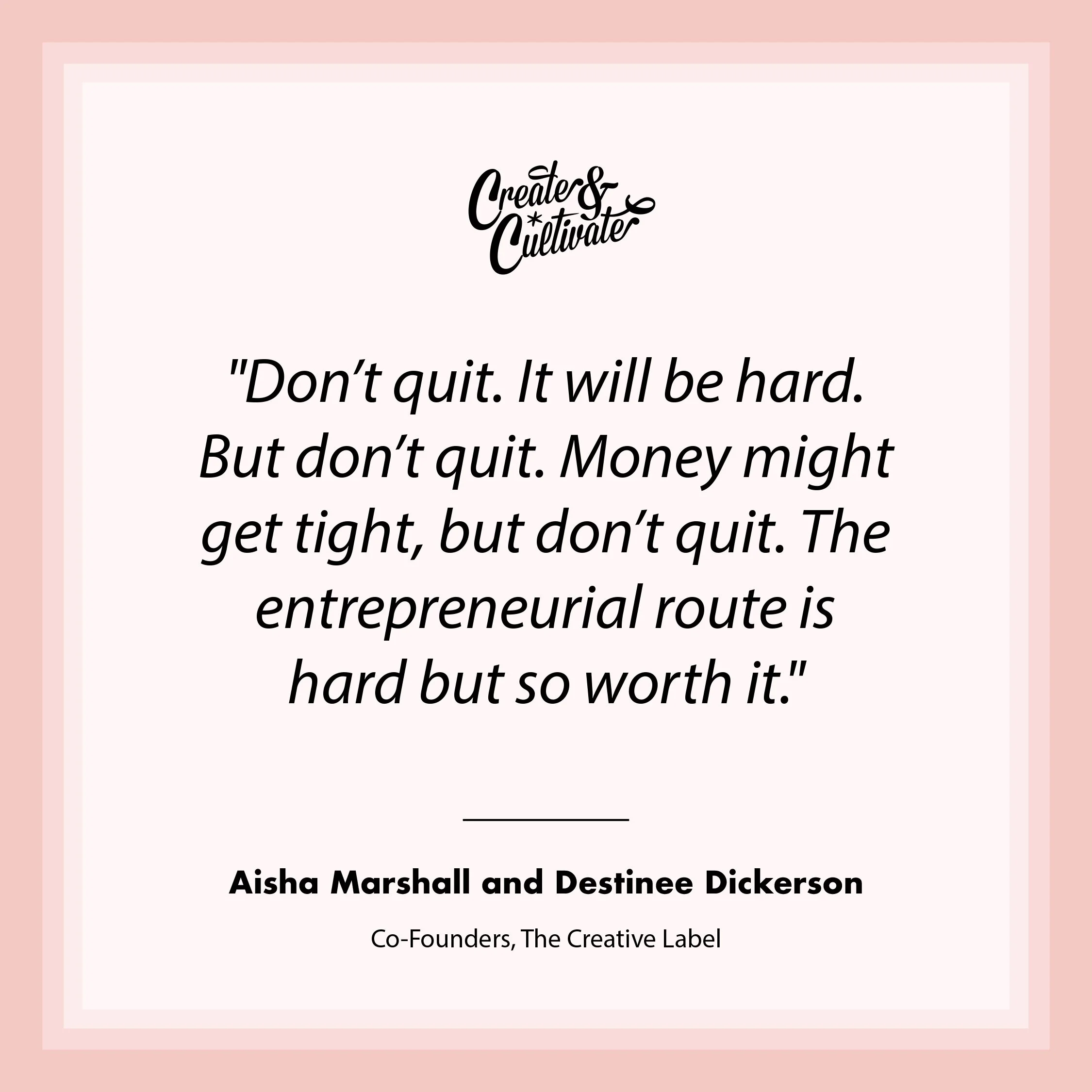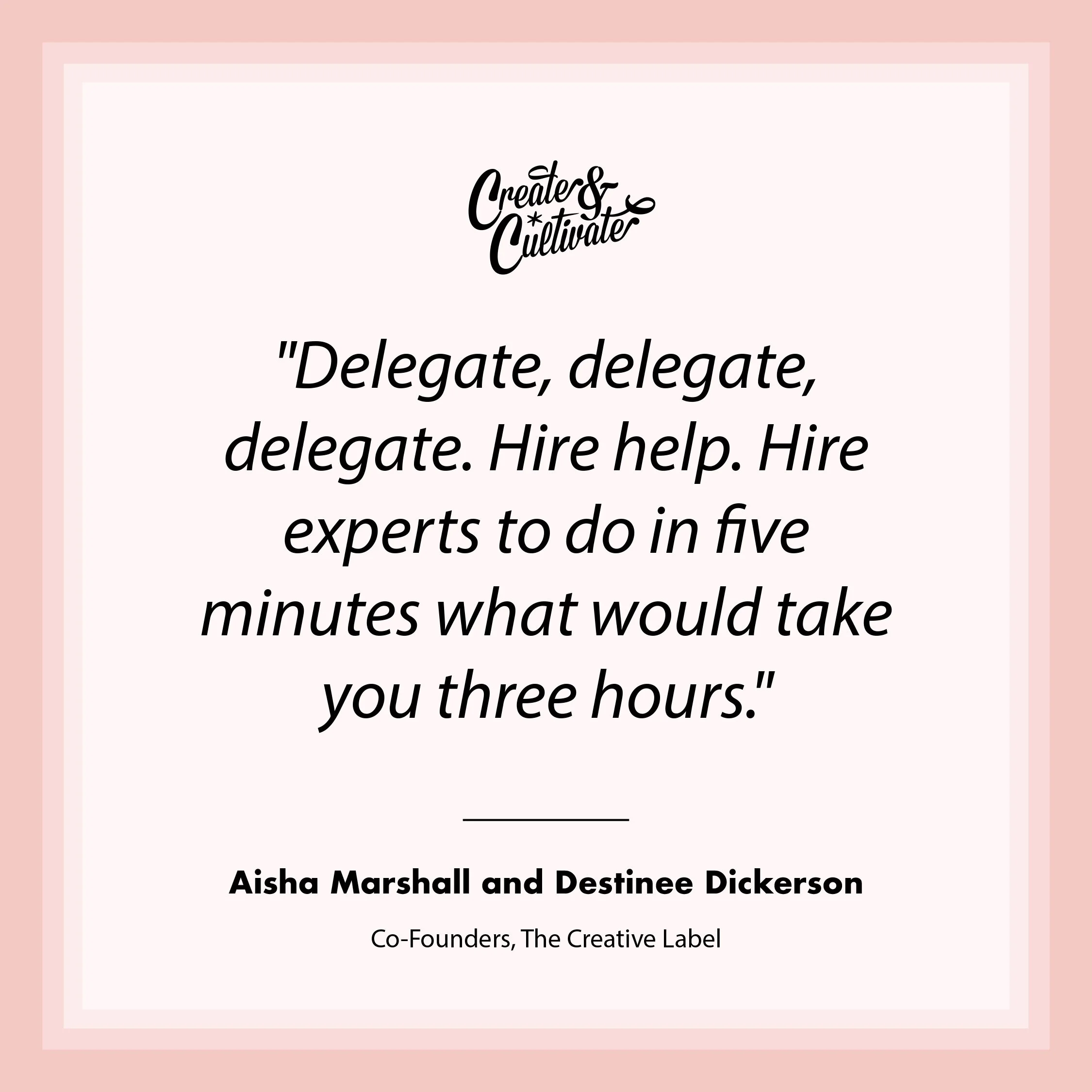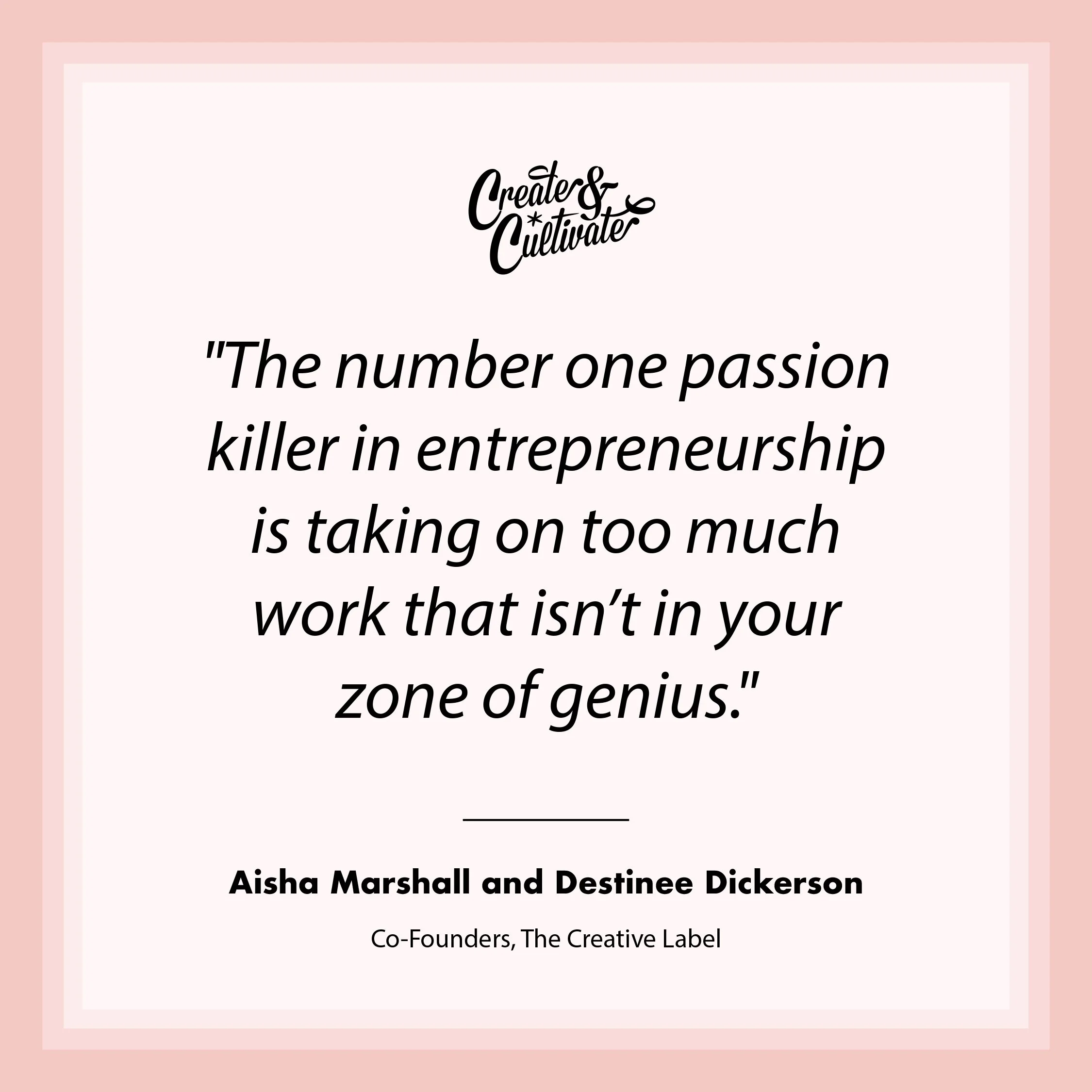We know how daunting it can be to start a new business, especially if you’re disrupting an industry or creating an entirely new one. When there is no path to follow, the biggest question is, where do I start? There is so much to do, but before you get ahead of yourself, let’s start at the beginning. To kick-start the process, and ease some of those first-time founder nerves, we’re asking successful entrepreneurs to share their stories in our series, From Scratch. But this isn’t your typical day-in-the-life feature. We’re getting into the nitty-gritty details of launching a business, from writing a business plan (or not) to sourcing manufacturers and how much founders pay themselves—we’re not holding back.
Photo: Courtesy of The Creative Label
When Aisha Marshall and Destinee Dickerson received the very first check made out to their creative agency, The Creative Label, there was just one problem—they couldn’t cash it. (Yes, you read that correctly.) As it turns out, the co-founders hadn’t quite gotten around to setting up a bank account for their burgeoning business. “We were two entrepreneurs with a passion and a purpose; creating amazing work was a higher priority than creating a business banking account,” Marshall and Dickerson told Create & Cultivate. “In fact, creating a business banking account was so far down on the list it wasn’t even on the list! We never thought to create one until that moment.“
Needless to say, they added “open a business bank account” to their to-do list and have been cashing checks ever since. Today, the best friends turned co-founders (not to mention, Forbes 30 Under 30 honorees, NBD) are at the helm of a sought-after, full-service branding agency that pushes creative limits and specializes in public relations, branding, and marketing. They’ve even expanded their business to include an aptly named podcast, The Label, in which they share valuable industry insights into everything from how to make money on social media and monetize a podcast to how to implement the latest marketing trends into a business strategy.
Here, Marshall and Dickerson share how they built their business from the ground up, including the crucial mistakes they made and learned from along the way.
Take us back to the beginning—what was the lightbulb moment for your business?
The lightbulb moment for our business was when we realized how big of a role self-work and an abundance mindset plays into not only being a successful business owner but also leaders of our team.
It all started when we went to the Fast Foundations Mastermind. Des and I were beyond excited to jump right into working on our business, finding out the tricks to scaling and networking like crazy. That’s not what happened on the first day. The first day was entirely self-work. Admittedly, during the first few exercises, I was irritated thinking “How does this apply?” I’m embarrassed at how wrong I was.
Some of the work we did that day showed me why we had the employees we had, why we were working with the companies we were working with, why we were making the money we were making, and ultimately, why we weren’t showing up as our highest self each day. Realizing the correlation between business and self-work was a mind-blowing moment for me.
After that initial first day, we committed to applying what we learned throughout each facet of business and life. We hired a business coach, Cayla Craft who focused solely on the inner-work and money mindset. Once we put into practice both the teachings from FFM and Cayla Craft, that’s when our business boomed. That’s a moment in business I don’t think I’ll ever forget.
Did you write a business plan? If yes, was it helpful? If no, what did you use instead? Why did you take that approach?
We attempted to, but it kept getting reworked. We started off as a branding agency, but we quickly realized that after you completed the project, you passed the client off. We wanted to be different. We wanted to be your in-house, outsourced agency. So as we added on more services the business plan began to change.
Something else that has been so influential to and very much business planning vibes was reading and implementing the teachings of the book “Traction.” This was super helpful once we started building our team, and I’d recommend it as a second step to your business plan.
How did you come up with the name? What was the process like? How did you know it was the right name? What are some of the things you considered during that process? What advice can you share?
I feel like I’ve mentally blocked that moment out. I really don’t remember much. What I do remember is what we told ourselves going into the process. We knew we wanted to find something that felt good and didn’t feel small. Something that felt like a large agency. Something that told you exactly the type of agency we are, without limiting our services. And that’s exactly what Creative Label is. We’re a creative group of geniuses whose purpose is to share in your vision and help showcase it to the masses.
The advice that I would give to anyone thinking of a name for their business is, first and foremost, don’t rush! Take your time. Make sure it feels right. Ask yourself questions like, does this name limit my brand or will it allow me to scale?
The next piece of advice I’d give is to make it unique. A unique name gives so much flexibility to a brand because—if the name is unique enough—there’s no other brand associated with it. This allows you to truly define what you want your brand to be. Not to mention, makes finding a URL and social handles much, much easier.
What were the immediate things you had to take care of to set up the business? What would you recommend to new founders reading this who don’t know where to start?
Oh my gosh—this is the funniest part about entrepreneurship. You don’t know what you don’t know. The immediate thing I would recommend doing is set up a business bank account.
When we got our first client, we were so excited. They mailed us a check made out to Creative Label for an amount that felt so huge to us at the time. We took it to the bank and guess what WE COULDN’T CASH IT!
Yes, you read that right. We could not cash our own check. Why? Because we didn’t have a business banking account. Because we were two entrepreneurs with a passion and a purpose; creating amazing work was a higher priority than creating a business banking account. In fact, creating a business banking account was so far down on the list it wasn’t even on the list! We never thought to create one until that moment.
Funniest #entrepreneurmoment ever!
After a business checking and savings account, I’d recommend the following:
Domain
Social channels
Trademark
Some of the biggest frustrations with clients are:
Not filing a trademark on a million-dollar idea and regretting it down the road.
Thinking of a really cool name, noticing it’s available on IG, then weeks later have the IG handle taken from under them because they never set up the account.
What research did you do for the brand beforehand? Can you explain how you found and compiled that research? Why would you recommend it and why is it important?
When we were building Creative Label, there was so much limited research out there. It was frustrating. Everyone was stingy with their knowledge. So much was developing with Facebook, Instagram, ads, and digital media in general that everyone wanted to keep their perceived edge.
This lack of information really shaped the type of company we are today. We realized that the industry we’re in is only as great as you make it. And without education, there’s no growth in the industry. So, we committed to education. This led to our company also serving as a media company. We have a blog and podcast which are platforms to serve our community. Through those channels, we share weekly updates about digital trends and updates and how they apply to businesses.
How did you fund the company? Did you pitch investors, do a friends-and-family round, or did you decide to self-fund?
We are totally self-funded. Our partners, both professional athletes at the time, wanted to support and invest in our business. But their careers were the driving force for our reason for self-funding. With the constant travel that comes with dating a professional athlete, it really pushed us to want our own thing—no strings attached. So we got scrappy, as all entrepreneurs do, and we funded the thing our damn selves, and I’m so happy we did.
What are some of the biggest money mistakes you made in the beginning and how did you recover from that? What advice can you share?
One of the biggest money mistakes we made was not creating a budget, not knowing how much it actually costs to run the business monthly, and sticking to a budget monthly. Knowing what we know now, we would both probably agree that hiring an accountant and a CPA way earlier on to help us with this would have saved us so much time, heartache, and money.
Did you work full-time at another job while building your business or did you just dive straight into it? Can you share your experience and what you would recommend to others?
While building Creative Label, I was in law school. It was my third year. I set up my 2L year pretty heavily so that 3L year I’d have a lighter load and allow me the flexibility to build a business on the side. I knew I wanted to be in a more creative space, and so Des and I began laying that foundation my 3L year with the goal of being ready to hit the ground running once I graduated.
Luckily, I had my then-fiancé, now-husband, supporting our household post-graduation. Our household really relied on him financially in those formative years. He was a great support system and that really helped me nurture my passion so it can make a profit.
How much did you pay yourself in the beginning?
For the first two years, we split up the money like this:
30% goes to taxes
20% goes to the business
25% commission to myself
25% commission to Des
Once we got to a consistent monthly income and started really building out a rockstar team, we put ourselves on salary thereafter.
How big is your team now, and what has the hiring process been like? What advice can you share?
We are a team of 15! The hiring process, initially, was tough. Here are some things we implemented that have really transformed our team to be more aligned with the company we’re building.
Create core values, then hire and fire by these.
Create “trip-wire” questions in your application process that are centered around attention to detail. Some examples are questions that end with “and when?” If the applicant gets the answer wrong, don’t go any further. You want someone that has good attention to detail.
State the role clearly, create goals, and provide incentives when they hit their goals.
Implement a 3-strike rule.
Did you hire an accountant? Who helped you with the financial decisions and set up? What do you recommend?
Yes, we hired an accountant early on. Our accountant has been an integral part of our business almost since its inception. She often acts as our tie-breaker when it comes to financial decisions. She got us set up with Quickbooks, which has really been helpful when reviewing the budget.
My recommendation with respect to finances is DO NOT PLAY WITH FINANCES. What good is a successful business if it cannot manage finances? That said, hire a quality accountant early on and pay them well.
Can you share the biggest learning curve or challenge since starting your business and why?
Boundaries. As a service-based company, setting boundaries has been very difficult. It got really bad before we realized it wasn’t working. Clients would text us on holidays expecting us to drop everything we were doing for a non-urgent matter. Because we operated with a scarcity mindset and worried about money, we wouldn’t set boundaries.
We’d allow clients to text or call at all hours of the day. I hate to even admit it, but I will. It’s important to tell the full truth about entrepreneurship because it isn’t always glitz and glam. There were many times where we would allow clients to be disrespectful.
The stress from not having boundaries and working from an abundance mindset and not a scarcity mindset (shout out to our business coach), is really what made us re-evaluate and only work and operate in ways that are aligned with our core values.
Do you have a business coach or mentor? How has this person helped? Would you recommend one? How do you find one?
Yes, for us it was a business coach and a mastermind group. First, our business coach Cayla Craft’s teachings and philosophies have really helped both in my personal life and business life.
Second is the Fast Foundations Mastermind ran by Chris and Lori Harder. Since working with them we’ve experienced a crazy amount of growth!
I would recommend a quality business coach and mastermind 10x10. You can’t put a price on the accountability and business road-mapping—specific to you and your business—that you receive through a business coach like Cayla Craft and masterminds like Chris and Lori Harder.
How did you promote your company? What percentage of your budget goes to marketing and why? What challenges have you faced?
Crazy enough, we’ve put zero dollars into marketing. We’re solely word of mouth. For us, we get noticed by constantly showcasing the amazing work of our clients and our clients constantly showing how happy they are with their work product. There’s nothing like a referral, I’ll tell ya!
What is one thing you didn’t do in the setup process, that ended up being crucial to the business and would advise others to do ASAP?
Get that business banking account, girl! That and an attorney. Our attorney, Lauren Ruiz, is part of our arsenal. She has helped us with so much. After law school, I was only able to get our company so far with the knowledge I had. Lauren has helped us create a legal foundation that’s really allowed our company to be protected.
For those who haven’t started a business (or are about to) what advice do you have?
Don’t quit. It will be hard. But don’t quit. Money might get tight, but don’t quit. The entrepreneurial route is hard but so worth it. So let your passion continue to drive you. And like Kevin G says, “Don’t let the haters stop you from doin’ your thang.”
What is your number one piece of financial advice for any new business owner and why?
Pay your accountant well! Plan for your future, and set monetary goals for your business. Set up your IRA. Get insurance. Don’t pay yourself too much. Leave enough money for your business, don’t take too much for yourself.
If you could go back to the beginning with the knowledge you have now, what advice would you give yourself and why?
Delegate, delegate, delegate. Hire help. Hire experts to do in five minutes what would take you three hours. Understand that you don’t need to do it all and asking for help doesn’t make you an imposter. Feeling like I need to do it all really burnt me out. The number one passion killer in entrepreneurship is taking on too much work that isn’t in your zone of genius. Read that twice if you have to.














Missed out on Gina Bianchini’s incredible session from our Offsite? No worries! We’re sharing her insights on building a thriving community that feels like a real network, not just an audience.